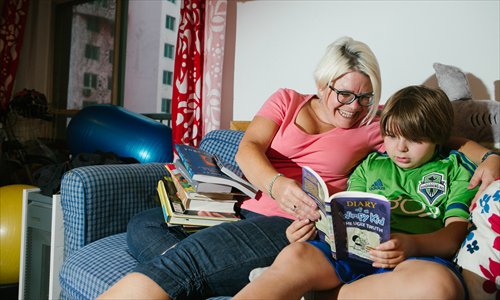Climbing tuitions of international schools drive foreign families away

Six-year-old Asta from Denmark got the chance last year to attend the House of Knowledge International Kindergarten thanks to a scholarship, as her family could not afford the tuition. Photo: Li Hao/GT
Although American expat Theresa Ahdieh and her husband, a software engineer at Microsoft, have been happy living in Beijing over the past five years, they recently made the difficult decision to move back to Seattle next month. The reason? They can't afford the tuition of international schools for their 10-year-old son Ty.
"He asked me, 'Mom, can I go to the Western Academy of Beijing (WAB) or British School of Beijing, Sanlitun like my friends?' And I had to tell him we couldn't afford it," Ahdieh says. "He even asked if his dad could go work as an IT teacher at one of the schools, so that we could get the discount and he could see his friends every day."
It's an increasingly common problem among expat families living in Beijing, many of whom are finding the staggering costs of international schools to be prohibitively expensive to remaining in the city. This isn't just the case for lower-income families; even those, like the Ahdiehs, who receive relocation packages, often find that the funds allocated for their children's educations are insufficient to cover international school tuitions. That means paying out of pocket to the tune of tens of thousand of dollars a year.
"Sending him to Western schools like WAB or International School of Beijing (ISB) costs more than a college education for my daughter, say at least $30,000 every year," says Ahdieh, whose 17-year-old daughter will begin attending university next year. "I can not afford that."
The struggle to afford schooling
Some parents manage to make it work, but not without painful sacrifices. Among them is Anna Gillian (pseudonym), an American who works in the medical industry, and says she doesn't know how much longer they'll be able to afford to send their two teen daughters to WAB, a top international school.
It's no wonder when you look at the stats - according to edu.sina.com, the annual tuition for a junior or senior at the school in 2014 cost more than 200,000 yuan ($30,900).
The cost has had a real effect on their standard of living; in the two years since they came to Beijing, Gillian says they've had to continually tighten their belts in order to afford the two girls' tuition, downsizing their apartment and cutting out vacations. Although Gillian works part-time and her husband works full time, neither has an expat package.
"We're trying really hard, but unfortunately, the situation isn't great, because there just aren't that many options."
Gillian said that other expats she knows in the same situation are planning to leave or have already left.
It isn't just an issue for the parents of high school students. For Conan Smith (pseudonym), an Australian who works (ironically) on the administrative staff of an international school, even the prospect of pre-school tuition for his baby girl is enough for him to consider returning to Australia.
"It is unfortunate that there aren't more options for expat parents on low-middle incomes," he said. "For me, the annual tuition costs for pre-kindergarten at a standard local international school is the equivalent of my entire year's salary."

Theresa Ahdieh reads a book with her 10-year-old son Ty at home. Due to the high tuition of international schools, they will return to the US this May. Photo: Li Hao/GT
Reasons for high tuitions
While the high costs of private schools might be more stark in someplace like Beijing, where foreign families are less likely to use the public education system, they aren't completely out of line with tuition levels in the West.
According to Christopher Lipinski, the principal of Joystar International Kindergarten in Wangjing, the tuition in Beijing is about on par with that of private schools in New York.
"Quality schools [in New York] are often private schools with wildly high tuitions that are higher than top schools like WAB in Beijing," says Lipinski, who hails from New York and has worked in education for more than six years in Beijing.
But Beijing might soon outpace its international peers. According to a 2013 report by Phoenix Weekly, the tuition of international schools in Beijing is currently increasing at an average rate of 10-20 percent each year.
Among the biggest costs for these schools, according to Lipinksi, is teacher salaries, due in large part to the demand for low student-teacher ratios as well as the scarcity of qualified teachers.
"Foreign teachers are in great demand. If you want to attract good talent, you have to pay more competitive salaries, which will be seen in the tuition rate paid by parents," Lipinski says.
According to the 2015 International Schools Report issued by edu.qq.com, international schools across China have an average student-teacher ratio of 9.1:1. As Western international schools are seeing rapid expansion, foreign teachers are in great demand, resulting in generous packages that often make up the bulk of many schools' expenses.
Josephine Wilson (pseudonym), an American teacher at a well-known international school with over 15 years of experience, told Metropolitan that her top criteria for choosing a school is whether they can offer a competitive salary and benefits package (visa, work permit, insurance, schooling for kids, etc.), as well as the school's values and reputation.
Further complicating some schools' search for qualified teachers are changing visa laws as well as Beijing's worsening pollution.
"In recent years, the requirements for getting a visa have become much more strict. It makes it harder to find quality teachers, as some of the visa restrictions don't necessarily screen out bad teachers, it just makes the pool of available teachers smaller," Lipinski says. "Also, many foreign employees don't want to come to Beijing because of the pollution."
The local government has also been issuing more stringent standards for foreign teacher qualifications, which not only makes hiring more difficult, but could lead to further increases in tuition, said a 2014 report by Beijing Business Today.
But Wilson says that some of these costs have more to do with marketing than with providing a quality education.
"I think about 80 percent of what goes on is marketing, and that is really unfortunate. It's not sustainable in terms of providing the best education for children," she said, adding that many parents are complicit in this scheme because they will always opt for the most expensive thing they can afford.
Exploring other options
But there are other alternatives to simply leaving Beijing, with some foreign families opting for Chinese public schools, cheaper private schools, or scholarships to more expensive international schools.
Charlotte Friis Lodahl, a Danish mother of two daughters, nine-year-old Laura and six-year-old Asta, is a case in point. She sent Laura to FangCaoDi International School, which offers lower tuition and had been recommended by friends.
Asta, meanwhile, was lucky enough to receive an SME scholarship (a scholarship aimed at the children of parents who work as entrepreneurs or at small- and medium-sized enterprises) to House of Knowledge International School & Kindergarten.
"I am not working here, but even when we both were working, paying tuition of around 180,000 yuan per child is not possible. That is 360,000 yuan a year just for schooling," said Lodahl, who does volunteer work, while her husband works as an entrepreneur. They have lived in Beijing for 12 years.
The scholarship, she says, is saving them up to 60 percent of what they'd pay per year on Asta's tuition. Otherwise, she would have had to homeschool Asta.
As for Laura, she is happy at FangCaoDi. "My daughter's math and especially Chinese skills are very high, which is a clear advantage compared to other 'international' schools," said Lodahl.
One downside, though, is communication. In addition to her daughter's homework being almost entirely in Chinese, meaning she's unable to help, Lodahl says they have very little communication with the school.
Other parents like Ahdieh are less willing to consider local schools.
"In Western schools, the education system values different ways of learning. But here in local schools, you have to be the same. The system is too rigorous and there are not enough after-school activities related to science, the arts, and so on," said Ahdieh.
Lipinski says that in addition to scholarships, parents can explore emerging schools that offer quality educations for a much lower price, though he added they should do their due diligence to distinguish the good schools from the bad.
Smith said that there is a high threshold for teachers wanting to work at the best international schools in Beijing; the problem is schools who label themselves as "international" but lack accreditation and have low barriers for hiring.
"Any school can call itself 'international,' but parents need to investigate properly to determine whether it has global accreditation and experienced, qualified teachers."
Jessica Adrian (pseudonym), an American who teaches at a small private school claiming to be international in Tongzhou district, agrees that the quality of international schools is not always good, and the term "international" is used too loosely.
"I work at the school, so my kids' tuition is nearly free, but I think the price for normal students is ridiculous for what they get," she says. "They promise a big international program and employ one or two foreign teachers who barely speak English. I think parents should take a closer look at what they really get for their money."
According to Lipinski, parents are becoming savvier about what constitutes a quality international education, and that's their best defense against avoiding shyster schools.
"Tuitions will continue to rise, but as more Chinese return from studying or working abroad, Chinese parents will gain greater insight as to what an international education truly is, and will place higher demands on international schools," he says. "I think this is a good thing, as it will ensure that schools continue to deliver quality education to families, both foreign and Chinese, in Beijing."
Newspaper headline: Shut out